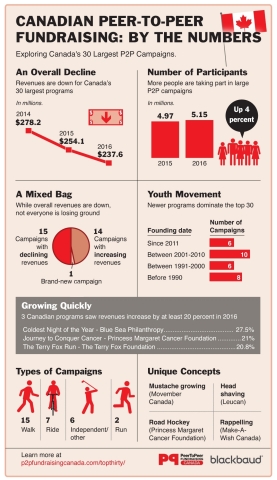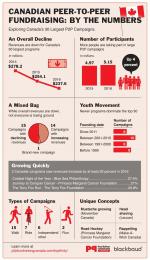Fundraising revenue for Canada’s 30-largest peer-to-peer fundraising programs declined 6.2 percent in 2016 — continuing a troubling trend for many of the country’s nonprofits.
This Smart News Release features multimedia. View the full release here: http://www.businesswire.com/news/home/20170712005591/en/

(Photo: Business Wire)
According to Peer-to-Peer Fundraising Canada’s Top Thirty Benchmarking Survey, revenues for the 30 bellwether programs totaled $237.6 million in 2016, down from a peak of $278.2 million in 2014.
But behind these seemingly bleak numbers are a number of trends that suggest that Canadian peer-to-peer fundraising is poised for growth.
A number of large Canadian peer-to-peer programs have been deliberately recalibrating and downsizing longstanding programs and are complementing flagship campaigns with initiatives that will help them reach a new generation of supporters.
In addition, many Canadian charities are seeing rapid growth in their peer-to-peer programs — particularly among newer and more creative program types.
Perhaps most encouraging, though, is news that a number of top programs are expecting revenue gains in 2017. While the fundraising year is still young, some large programs — including Toronto’s Princess Margaret Cancer Centre’s Ride to Conquer Cancer and Blue Sea Philanthropy’s Longest Night of the Year— are already reporting record revenues for their events in 2017.
“Our research shows that even though some peer-to-peer fundraising programs have struggled, the overall outlook for Canadian organizations is improving,” said David Hessekiel, president of Peer-to-Peer Fundraising Canada, which conducted the survey with sponsorship support from Blackbaud. “Many groups have been reorganizing their programs and spinning off new campaigns to shift to the changing attitudes of their supporters. And many organizations are seeing encouraging results because of those changes.”
Peer-to-peer fundraising programs engage supporters to solicit their personal contacts for contributions. These “asks” are often linked to a supporter’s participation in a rapidly expanding universe of events ranging from traditional runs, walks and rides to more unusual activities such as rappelling down skyscrapers, mustache growing and sleeping out in the cold.
Canadian charities have long relied on P2P campaigns to help them engage their most passionate supporters in raising money on their behalf. But Canada’s economic troubles and a growing number of competing programs have dampened results for many of the country’s largest and most established P2P programs.
The overall decline in Canadian P2P fundraising revenue is highly concentrated among the very largest and most established programs.
Seven of the eight largest Canadian programs saw their revenues decline in 2016 — and five of the top six programs saw their revenues decline by 11 percent or more.
Taken together, these eight programs saw their revenues decline by nearly $15.9 million — or 9.6 percent.
That massive decline comes even as Canada’s third-largest program — The Terry Fox Run — posted an impressive increase of 20.8 percent in 2016. Without the Terry Fox Run’s success, the picture among the top 8 programs would have been much darker.
But even among the programs that saw these big declines, the outlook for 2017 and beyond appears to be much rosier, said Heather McLean, a Senior Enterprise Solutions Consultant with Blackbaud.
Blackbaud, which sponsors the survey conducted by Peer-to-Peer Fundraising Canada notes that its own data reinforces many of the study’s findings — namely that a number of newer programs are growing quickly even as larger, more established campaigns are working to maintain previous results.
Outside of the eight-largest programs, revenues for the rest of the P2P Thirty actually increased slightly in 2016 — up 0.3 percent. And half of the programs on the list either posted increases or were brand-new programs.
Seven of the programs in the survey were 5 years old or younger in 2016 — spotlighting the fact that a number of new programs are seeing great success. This marks a stark difference with P2P programs in the U.S., where only one of the top 30 programs was founded after 2011.
Among these new programs is SickKids Foundation’s Great Cycle Challenge — a brand-new program in 2016 — which vaulted onto the list after raising nearly $1.8 million. This marks the first time that a virtual campaign has qualified for the top 30 in either the United States or Canada.
Canada’s 10 Largest Peer-to-Peer Campaigns in 2016
- Enbridge Ride to Conquer Cancer, Princess Margaret Cancer Foundation ($34.9 million)
- Relay for Life, Canadian Cancer Society ($29 million)
- The Terry Fox Run, Terry Fox Foundation ($23.5 million)
- CIBC Run for the Cure, Canadian Breast Cancer Foundation ($17 million)
- Movember Canada, Movember Canada ($14 million)
- Jump Rope for Heart, Heart and Stroke Foundation of Canada ($13 million)
- MS Walk, MS Society of Canada ($9.4 million)
- MS Bike, MS Society of Canada ($9.1 million)
- Big Bike, Heart and Stroke Foundation of Canada ($8.8 million)
- World Partnership Walk, Aga Khan Foundation Canada ($7.4 million)
ABOUT PEER-TO-PEER FUNDRAISING CANADA
Peer-to-Peer Fundraising Canada helps charities across Canada build peer-to-peer fundraising campaigns. Industry statistics, guidance on peer-to-peer fundraising best practices and access to year-round virtual training is available at www.p2pfundraisingcanada.com
View source version on businesswire.com: http://www.businesswire.com/news/home/20170712005591/en/
Contacts:
Peer-to-Peer Fundraising Canada
Peter Panepento,
202-531-3886
peter@p2pfundraisingcanada.com
